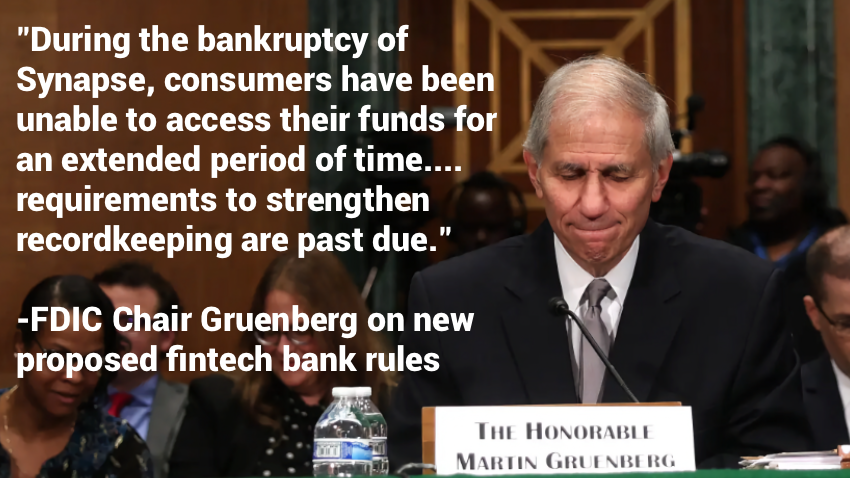Every Friday, we share items we’ve read that seem to have missed attention but inform and impact community financial institutions. This week, the FDIC looks at better consumer protection with fintech bank partnerships go bad.
1. Fintech forced to open up
The Federal Deposit Insurance Corporation (FDIC) this week proposed new record-keeping and compliance rules for banking partners of consumer fintech companies. The rules are in response to the backlash against fintech Synapse and the resulting loss of access to funds for consumers.
Banking Dive’s Gabrielle Saulsbery summarizes the scope:
Typically, non-bank fintechs deposit customer funds into a single custodial account at their partner bank, resulting in a customer account that may hold the funds of thousands of customers and businesses. As it stands, a partner bank might not be able to determine which customers own what funds within the account.
These rules aim to reduce the risks to consumers (and their overall trust in the banking system) in the event of a failure of a consumer fintech or other non-bank entity that stands between the consumer and the insured account institution, even if (or especially if) the consumer doesn’t have a relationship with any of those supporting entities (ala the Synapse scenario).
Key Impacts on Bank-Fintech Partnerships
The main impacts on banking partners fall into six categories.
-
Enhanced Recordkeeping- Banks will need to maintain detailed records identifying beneficial owners of deposits in custodial accounts, including individual balances and ownership categories.
-
Third-Party Relationship Management- While banks can outsource deposit management to fintech partners, they retain responsibility for ensuring compliance and maintaining direct access to all records.
-
Operational Risk and Continuity Planning- Banks must develop robust contingency plans to maintain access to custodial account records, even in the event of fintech partner disruptions.
-
Reconciliation and Validation- Daily reconciliations and periodic independent validations of custodial accounts will be required, increasing operational complexity.
-
Compliance and Reporting- New requirements include developing written policies, conducting annual tests, and submitting detailed reports on IT systems and custodial accounts.
-
Consumer Protection and Prompt Payment- Banks must ensure rapid determination and payment of deposit insurance claims in the event of bank failure, minimizing disruptions for customers.
If your institution provides these types of services for fintech partnerships, the proposal represents a non-trivial burden on continued operation, a new annual inspection point with regulators being a big one.
However, this also represents the potential for new insights and opportunities for supporting institutions. Having the regulatory requirement for tracking customer level data, account and transactional, provides way more insight and value. As opposed to aggregated and anonymized data, partner banks would be able to gain insights into trends, data needed for predictive modeling, and the exposure of their fintech partners’ customers. This becomes a first-party view of the market, vs. just being the “dumb pipe” to the deposit insurance.
Expect heavy pushback from fintechs and their trade lobbies as this potentially deals a very strong hand to partner FIs.
And that is it for this Friday. For the low price of $499,000, you can live in a bank branch, complete with a vault converted to a wine celler. Click below to let us know how we did:

